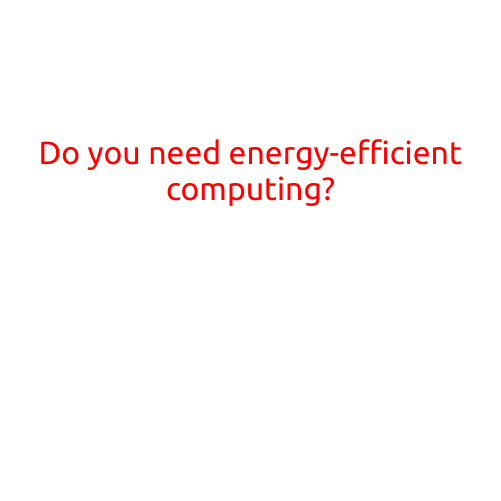
Do You Need Energy-Efficient Computing?
As technology advances, our devices are becoming more powerful and capable than ever before. However, this increased power comes at a cost – a significant drain on our energy resources. As concerns about climate change and environmental sustainability continue to grow, the importance of energy-efficient computing has become more pressing than ever.
In this article, we’ll explore the benefits of energy-efficient computing and help you determine whether you need it in your daily life.
What is Energy-Efficient Computing?
Energy-efficient computing refers to the design and implementation of computer systems, devices, and applications that consume less power while still providing the same performance and functionality as their non-efficient counterparts. This is achieved through various techniques, including:
- Processor design: Improving the efficiency of processors to reduce power consumption while maintaining their processing power.
- Memory management: Optimizing memory usage to reduce the amount of power required to store and access data.
- Low-power modes: Allowing devices to enter low-power modes when not in use, reducing standby power consumption.
- Sustainable materials: Using environmentally friendly materials in device manufacturing to reduce waste and minimize ecological impacts.
Why Do You Need Energy-Efficient Computing?
The benefits of energy-efficient computing are numerous and significant:
- Cost savings: Reducing energy consumption translates to lower electricity bills for you and lower operational costs for businesses.
- Environmental impact: Less energy consumption means less carbon emissions, contributing to a reduction in greenhouse gases and global warming.
- Increased computing power: Energy-efficient computing allows for more powerful computing at the same energy consumption levels, making it possible for us to tackle complex tasks and simulate complex systems that were previously impossible.
- Improved reliability: Energy-efficient devices tend to run cooler and quieter, reducing the risk of overheating and failure.
When Do You Need Energy-Efficient Computing?
While energy-efficient computing is beneficial for everyone, there are certain scenarios where it’s particularly important:
- Businesses and organizations: Companies that rely heavily on computing power, such as data centers, financial institutions, and scientific research organizations, can greatly benefit from energy-efficient computing.
- Home users: Individuals who use their devices for extended periods, such as gamers, video editors, and remote workers, can also benefit from energy-efficient computing.
- Data centers: Cloud computing and data storage facilities require massive amounts of energy. Energy-efficient computing can help reduce their carbon footprint and operating costs.
- The environment: Anyone concerned about the environmental impact of technology can benefit from energy-efficient computing.
Conclusion
Energy-efficient computing is no longer a luxury, but a necessity. As our devices continue to become more powerful and compute-intensive, the need for energy-efficient computing will only continue to grow. Whether you’re a business, home user, or environmentally conscious individual, adopting energy-efficient computing practices can have a significant impact on your bottom line, the environment, and the future of our planet.





